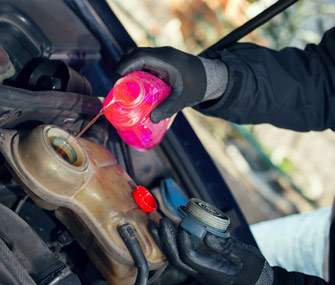Poisons to Protect Your Dog From
Published on March 22, 2016
Skip To

Medicine for humans is a common source of poisoning in dogs. Dogs tend to eat entire bottles of pills or tubes of ointment, and some drugs can be toxic to dogs even in small doses. It’s important to store your medication out of your dog’s reach and never give your dog medicine meant for people unless instructed to do so by your veterinarian.
Garage chemicals like antifreeze, gasoline, motor oil, propane and diesel can be fatally poisonous to dogs. They should be stored out of reach, with any spills mopped up.
Additionally, poisons meant to kill rodents, insects and other pests can pose a threat to your dog. It’s important to keep your dog away from areas treated by these products as well as to keep him away from any animals that may have been killed by them.

Paint, golf-ball coatings and other items containing lead can be poisonous to dogs, as can items containing zinc, like pennies, metallic nuts and bolts and some creams.
Finally, it’s generally not a good idea to give your dog table food. Some human foods can be toxic to dogs, including chocolate, coffee, onions, sugar-free candy and gum, raisins, grapes, macadamia nuts, yeast bread dough and alcohol.
Signs of poisoning vary depending on what your dog may have ingested but may include vomiting, depression and convulsions. When in doubt call your veterinarian or an animal poison-control hotline immediately and, if possible, have the label of the suspected poison available since poisons can act in different ways. The ASPCA has a 24-hour poison-control hotline at 888-426-4435. The Pet Poison Helpline number is 855-764-7661. (Note: Callers will be charged a consultation fee.)
More on Vetstreet:





